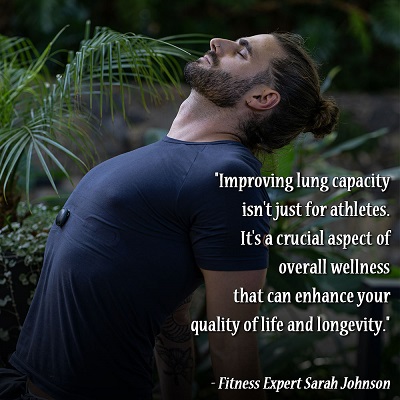 Have you ever thought about how much air your lungs hold? Perhaps when you have blown up a balloon you have taken a look to see how big you can get it in one blow. If you are competitive, perhaps you have compared it to others and tried to make yours the biggest! Well, our lung capacity varies from person to person, but on average, our lungs can hold around 6 liters of air.
Have you ever thought about how much air your lungs hold? Perhaps when you have blown up a balloon you have taken a look to see how big you can get it in one blow. If you are competitive, perhaps you have compared it to others and tried to make yours the biggest! Well, our lung capacity varies from person to person, but on average, our lungs can hold around 6 liters of air.
However, as we age, it’s not only our skin that loses its elasticity, our lungs do too, reducing how much air they can hold and weakening their function.
While it’s natural for our lungs to decline a little over time, other factors can also affect their capacity. These include a sedentary lifestyle, obesity, and chronic lung diseases like asthma or COPD (chronic obstructive pulmonary disease). There are other factors too, but these are the main ones.
You may not be aware if your lung capacity has decreased over time. Symptoms like shortness of breath or difficulty breathing might make you wonder why. Perhaps you feel more fatigued than usual. However, there is good news, so don’t become overly alarmed! Your lungs aren’t destined to stay this way forever. You can do something about it. You can increase your lung capacity through breathing techniques, exercises, and lifestyle changes.
Practice Deep Breathing or Diaphragmatic Breathing
Deep breathing helps expand your lungs and reach their full capacity. As you fill your lungs with air, it stretches the lung tissue and strengthens the respiratory muscles.
Diaphragmatic breathing focuses on strengthening the diaphragm too, which is important for taking deep breaths. It’s also called belly breathing, and helps improve the rate at which your lungs expand and contract.
Regular deep breathing exercises can gradually increase your lung volume, which is the amount of air your lungs can hold. With practice, you will be able to take in more air with each breath.
If you have been leading a sedentary lifestyle, your airways might have become narrowed. If they are not exercised, they become sedentary too! Deep breathing can help open them up and improve your overall lung capacity.
To start deep breathing, get comfortable first. You can either sit or lie down. Inhale slowly and deeply through your nose and allow your belly to rise as your lungs fill with air. Place your hand on your belly or diaphragm and feel it go up and down. This is to make sure the air goes way down into your lungs and not just sitting up high in your chest.
Hold your breath for 3 to 5 seconds to give your lungs time to expand fully and stay expanded. Now exhale slowly and completely through your mouth and let your abdomen fall. Repeat 5 to 10 times at least. The more the better!
Diaphragmatic breathing is particularly beneficial to people with COPD. This technique can improve your COPD symptoms over time, although it can’t reverse the condition.
Count Your Breaths
Increasing the time you inhale and exhale can also help increase your lung capacity. To know how long this is for you, count how long it takes for you to do a normal breath in and exhale it. It might take you five counts to inhale and five counts to exhale for example.
To increase this number, add one more count to each breath you take and practice until you’ve comfortably extended the time it takes you to inhale and exhale. Remember that it should be a gradual process that won’t strain your lungs or cause any discomfort. After a week what’s your count? After a month is it even better?
Sing and Have Fun While Increasing Your Lung Capacity
Yes, singing can help expand your lung capacity. Singing requires you to control your breath and expand your lung tissue. It strengthens your respiratory muscles as you hold notes or sing long phrases. Like any exercise, consistency is key. So start singing regularly and often and know you are keeping your lungs in tip-top condition!
Make Some Lifestyle Changes
Your lifestyle can also affect your lung capacity. You must limit yourself from being exposed to air pollutants and toxins, including toxic cigarettes. These include other people’s cigarettes too! Get them to not smoke around you and don’t be afraid to stick up for your health.
You need to exercise, and when you do, you are exercising your lungs. When you go walking why not practice your deep breathing at the same time? You will get double the benefits!
Your lung capacity may decrease as you age, but you can do something about it. You can improve their function with the above techniques, and improve your overall respiratory health. With persistence and dedication, you can increase your lung capacity and be the envy of all balloon blowers!






